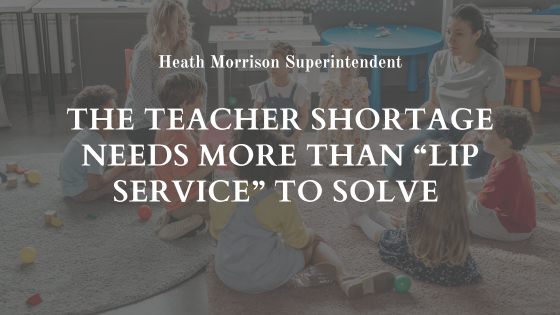I’m always appreciative when someone knows my background as a superintendent and industry leader in education and tells me how much they value teachers. Usually, it’s to share stories about how a teacher helped shape their life or the extraordinary impact teachers are having on their children. Political leaders from both sides of the aisle speak about supporting teachers and praise what they do. So, why is it, with some much private and public praise for teachers, the profession as a whole is so disrespected?
I remember speaking at a Chamber of Commerce luncheon when I was a superintendent. There was a lot of focus on how much appreciation the group had for educators, however when I asked a simple question, “Raise your hand if you would be happy if your child came home from college and shared their intent to teach.” I was shocked. With over a thousand attendees, less than ten hands raised, and then one person raised their hand to indicate it was only for Teach for America. When I asked why this distinction, he said, “It would only have to be for two years.” Only “have to be” for two years.
Again, it’s fair to ask, why the disconnect? This was an audience of smart, civic-minded individuals who support teachers but would prefer their children avoid the profession. Certainly, pay is a major issue. The need to raise teacher salaries has been a common call to action for decades yet the rhetoric rarely amounts to more than nominal increases. It’s not only the startling salaries that need to be adjusted; it takes far too long for teachers to advance in the pay scale so they can keep pace with other professionals in other industries. And, within the teaching field, there has to be support for increasing pay for teachers who are clearly “master educators,” proven by a multitude of metrics, as well as additional support for those who teach in hard-to-fill areas. The concept of paying every teacher the same based on years of experience, and perhaps advanced degrees, has helped contribute to suppressing the growth of educator pay. Many policymakers say pay will not make a difference in attracting or retaining people into teaching; I would prefer to try it and then look for other solutions.
However, I would concur that pay alone will not move the needle. As a country, we tend to lift up individual teachers but devalue the profession. As various lawmakers and reformers try to improve education they often do so without getting teacher input or opinions. While any number of levers are tried to reform schools, investing in quality professional development, career ladders, and dedicated planning time are rarely lifted up as solutions. All are areas quality teachers have advocated for years.
We are in the early stages of a national teacher shortage and it’s only projected to get worse. By 2025 it is projected the nation will face more than 300,000 teaching vacancies. It’s long past time to simply give “lip service” to the value of teachers and invest in the profession that invests so much in our children.

